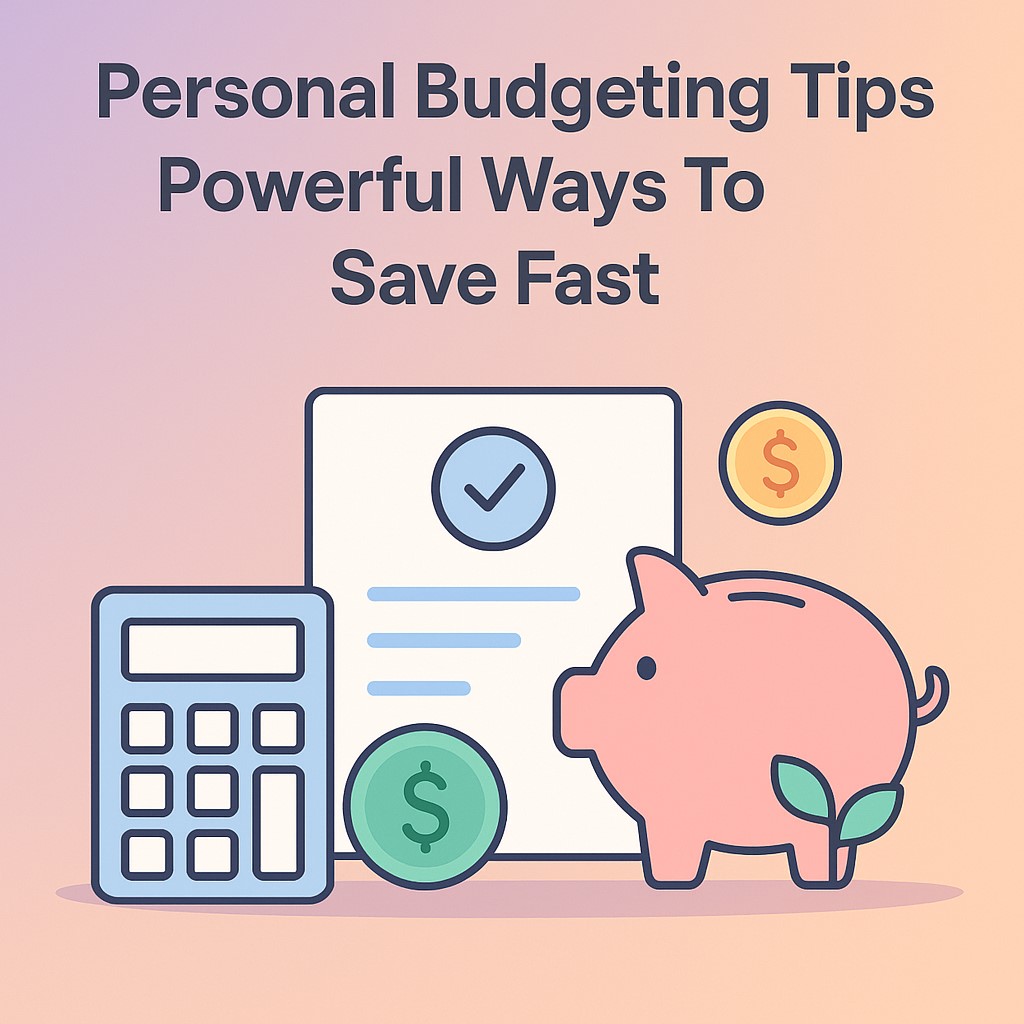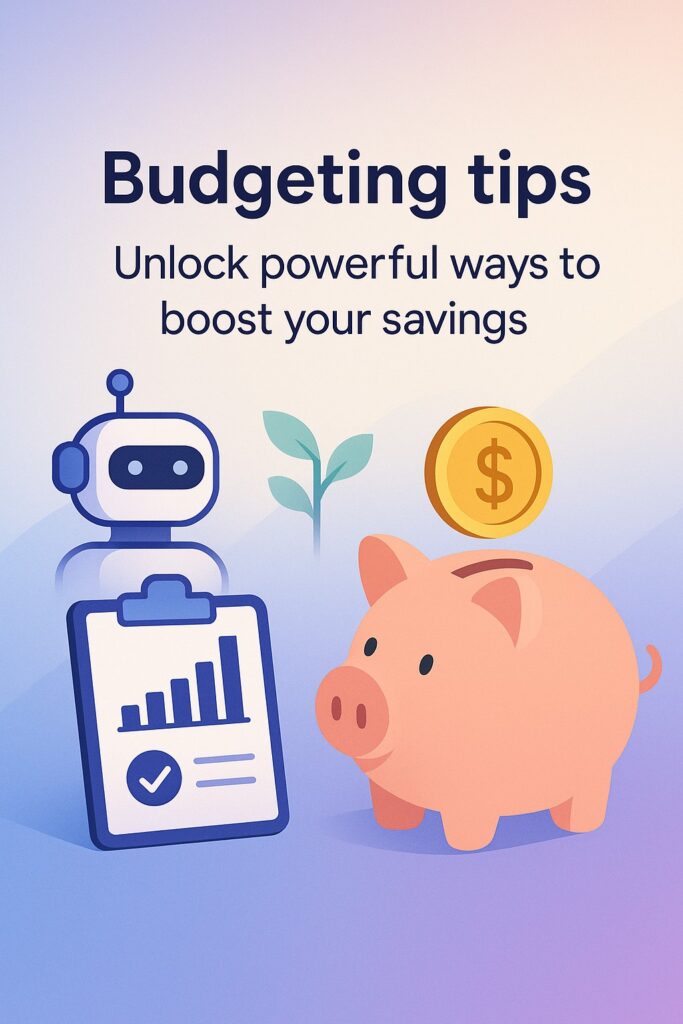Stressed about money? These personal budgeting tips make it easy to save, spend smarter, and take control, perfect for students trying to manage life on a budget.
Money can feel tricky when you’re in school or just starting your adult life. Between classes, part-time jobs, and social plans, it’s easy to lose track of spending. That’s where personal budgeting tips come in.
Personal budgeting tips are simple ways to manage how much money comes in and where it goes. These tips help you plan for your needs, save for goals, and avoid random spending. Think of them as your money map—they guide you so you don’t feel lost or stressed.
Students often deal with tight budgets. Rent, food, books, and fun add up fast. By learning a few solid personal budgeting tips, you can stretch your money and still enjoy life. It’s not about cutting out everything you love—it’s about making smarter choices that give you more control.
Let’s break down how easy and helpful budgeting can be, with clear steps that fit your day-to-day life.
Table of contents
- Personal budgeting tips using AI budgeting tools
- How to use AI for personal budgeting tips?
- Smart personal budgeting tips with automation
- Tech tools that improve personal budgeting tips
- AI-driven personal budgeting tips that work
- Digital hacks for personal budgeting tips with AI
- Machine learning and personal budgeting tips
- Voice assistant personal budgeting tips for teens
- Chatbot-powered personal budgeting tips to try
- Daily tracking with AI and personal budgeting tips
- AI-powered savings and personal budgeting tips
- FAQs: Personal budgeting tips
- Conclusion
Personal budgeting tips using AI budgeting tools
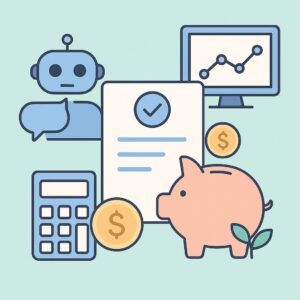
Use smart tools to track money and save better. Managing your money can feel hard—especially when you’re juggling school, work, or daily life. But with AI budgeting tools, it gets easier. These tools do the thinking for you. They help track your spending, plan your savings, and give real-time advice. Here are some personal budgeting tips that make AI tools work in your favor.
Pick an app that learns your habits
AI tools like Cleo, Monarch, and YNAB (You Need A Budget) track your spending patterns. They notice when you overspend or skip saving. Over time, they offer tips that actually match your lifestyle. For example, if you always spend more on weekends, the app might suggest setting a weekend limit. This is one of the best personal budgeting tips for staying in control without stress.
Set small goals with smart reminders
Many AI budgeting tools let you create goals like saving for a concert, a trip, or even books. You just set the goal, and the app reminds you to save a little at a time. Some apps even move extra money to savings for you, using automation. These reminders help you build a habit without needing to think about it every day. This is where smart personal budgeting tips really make a difference.
Let AI handle your daily tracking
Tired of checking your bank balance every few hours? AI apps connect to your bank account and track everything automatically. They sort your spending into categories like food, travel, or entertainment. Then they show easy-to-read charts or summaries. You can even ask questions like “How much did I spend on coffee this week?” and get instant answers. Tools like this take personal budgeting tips to the next level.
AI budgeting tools are smart, simple, and super helpful—especially for students or young adults. By using them, you can follow personal budgeting tips that actually fit your life and money style.
How to use AI for personal budgeting tips?
Let AI help you make smarter money moves. AI is everywhere—now it’s even helping with your budget. Instead of guessing where your money goes, AI shows you. It tracks your spending, gives you smart suggestions, and helps you stay on track. Let’s explore how to use AI the right way for personal budgeting tips.
Connect your accounts for instant tracking
Most AI budgeting apps work best when linked to your bank account. Once connected, the app watches your spending and breaks it into categories. You’ll see where your cash really goes—like food, streaming, or shopping. This gives you a clear picture and is one of the most helpful personal budgeting tips you can follow.
Use AI to spot patterns and cut waste
AI doesn’t just track. It notices trends. For example, if you always spend more at the start of the month, the app might suggest spreading out your spending. It could even alert you when you’re close to going over budget. These small nudges can save a lot. That’s why using AI is a smart way to follow personal budgeting tips without feeling overwhelmed.
Get daily or weekly budgeting advice
Some apps send you updates or advice based on how you’re doing. If you’re saving well, they cheer you on. If you’re slipping, they give tips like skipping a takeout meal or lowering your subscriptions. This kind of support makes personal budgeting tips feel more personal and less like a chore.
AI makes budgeting faster and easier—especially for students or anyone new to money management. It turns confusing numbers into simple suggestions that work in real life. With the right AI tools, personal budgeting tips can actually be fun to follow.
Smart personal budgeting tips with automation
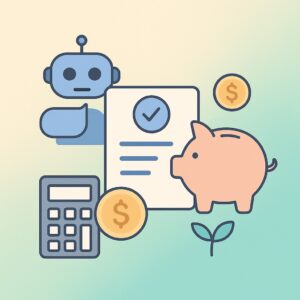
Save money without thinking too hard. Automation makes budgeting super easy. You don’t need to remember when to save or where your money is going. With a few smart settings, your budget can run on autopilot. Here’s how automation helps with personal budgeting tips you can actually stick to.
Set up automatic savings
Most banking apps or digital wallets let you move money into savings automatically. You can pick a small amount, like $5 or $10, to transfer weekly. It doesn’t feel like much, but it adds up fast. This is one of the easiest personal budgeting tips to follow, especially when you’re busy with school or work.
Use auto-pay to avoid late fees
Missing a bill can mess up your budget. That’s why it’s smart to turn on auto-pay for things like phone bills, subscriptions, or rent. It keeps you on track and saves you from extra charges. Personal budgeting tips like this help you stay stress-free and organized.
Let apps sort and track your spending
Many budgeting tools can automatically sort your spending into categories. You don’t have to enter anything yourself. The app sees a purchase and tags it—like food, travel, or shopping. It shows what you spend most on and where to cut back. These kinds of personal budgeting tips are perfect if you’re not into spreadsheets or detailed tracking.
Automation takes the pressure off. You save without trying, pay on time, and always know where your money is going. For students and young adults, these personal budgeting tips with automation are a smart way to stay in control.
Tech tools that improve personal budgeting tips
Use smart apps to stay on top of your money. You don’t need to be a finance expert to budget well. With the right tech tools, you can track your money, save more, and spend smarter. These tools make personal budgeting tips easier to follow and more fun to use.
Try budgeting apps made for students
Apps like Goodbudget, Rocket Money, and Fudget are designed with simple features. They show how much money you have, how much you’ve spent, and what’s left for the week. Many even include visual charts. These tech tools support personal budgeting tips by making your spending habits easy to understand.
Use browser extensions that monitor spending
Extensions like Snoop or Honeydue track your spending right from your browser. They highlight subscriptions, warn you about overspending, and even suggest savings. If you shop online a lot, these tools help you stay within limits. These extensions turn everyday actions into helpful personal budgeting tips.
Set smart notifications for goals
Some tools let you set goals like “save $100 in one month.” You can turn on alerts that remind you to stay on track. When you’re close to the goal—or falling behind—the app lets you know. This tech-powered approach makes personal budgeting tips more interactive and keeps you focused.
Using tech doesn’t mean doing more work—it means doing budgeting the smart way. With tools built for students and young adults, these personal budgeting tips are easier to apply, stick to, and actually enjoy.
AI-driven personal budgeting tips that work

Let smart tech guide your money decisions. If managing money feels confusing, AI can make it simple. It looks at how you spend, what you save, and gives you advice that fits your lifestyle. These AI-driven personal budgeting tips are perfect for students and young adults who want fast, smart help with their money.
Use AI to create a custom budget
Apps like Cleo and PocketGuard use AI to study your spending habits. They look at what you usually buy and how often. Then, they build a budget that matches your routine. You don’t need to guess what to cut. These tools give personal budgeting tips that feel made just for you.
Get real-time alerts and advice
AI tools don’t just build budgets—they also coach you. If you’re about to overspend, they’ll send a quick alert. If you’ve been saving well, they’ll cheer you on. This kind of instant feedback helps you stick to personal budgeting tips without feeling stressed or lost.
Track progress with smart insights
Some AI tools show graphs, charts, or weekly reports. These visuals break down your spending and show patterns over time. You’ll see what’s working and what needs change. These clear reports turn personal budgeting tips into easy steps you can follow every month.
AI doesn’t just help you save—it helps you understand your money. That’s why AI-driven personal budgeting tips really work, especially when you’re just starting out.
Digital hacks for personal budgeting tips with AI
Use smart tricks to make budgeting fun and easy. Budgeting doesn’t have to feel boring. With AI and a few digital hacks, you can make the process fast, smart, and fun. These ideas are perfect for students and young adults trying to stay in control of their money.
Set spending limits with AI alerts
Many AI-based apps let you set spending limits by category—like food, shopping, or transport. When you’re close to the limit, the app gives you a heads-up. These alerts help you stay on track without checking your budget all the time. Tools like these make personal budgeting tips easier to follow in real life.
Use AI to track small daily expenses
Sometimes it’s the little purchases that mess up your budget. Coffee, snacks, or streaming services can add up. AI tools automatically track those tiny expenses and show how they impact your monthly goal. These personal budgeting tips keep you aware of where your money goes—even the small stuff.
Turn on daily budgeting reminders
Apps like YNAB or Copilot let you schedule reminders that pop up daily. These reminders can be tips, goals, or even short notes from your past self. They give your budget a personal touch. Plus, using these features turns smart tech into simple personal budgeting tips you’ll remember to use.
Digital hacks like these help you budget in a way that fits your routine. You don’t need spreadsheets or long checklists. Just a few smart settings and AI tools are enough to make personal budgeting tips work smoothly every day.
Machine learning and personal budgeting tips

How can smart systems improve your money habits? Machine learning isn’t just for tech experts—it’s already helping students and young adults manage money better. These systems learn from your spending patterns and give personal advice that fits your life. Let’s explore how machine learning powers smart personal budgeting tips that actually work.
It learns from your past
Machine learning tools look at your past transactions. They track what you spend on food, rent, or entertainment. Then, they predict what you might spend next month. This helps you plan better without doing the math yourself. These insights turn personal budgeting tips into clear actions you can follow.
It adjusts as your habits change Personal budgeting tips
Your budget isn’t always the same. You may spend more during exams or holidays. Machine learning tools spot these changes and adjust your budget automatically. So you’re never stuck with a budget that doesn’t match your life. That makes personal budgeting tips smarter and more flexible.
It spots money-saving opportunities
These tools do more than just track—they help you save. They can suggest cheaper subscriptions, detect hidden fees, or highlight discounts. By using real-time data, they give you savings tips you might miss on your own. It’s like having a digital money coach built into your phone.
Machine learning makes budgeting feel less like work and more like support. It personalizes every suggestion, turning basic personal budgeting tips into smart, easy steps you can follow every day.
Voice assistant personal budgeting tips for teens
Talk to your tech and track your cash. Voice assistants like Siri, Alexa, and Google Assistant aren’t just for setting alarms or asking the weather. They can help you build smart money habits too. With a few simple voice commands, you can manage your budget hands-free. These tools are super helpful, especially if you’re just starting out with money goals.
Ask for daily spending updates
You can ask your voice assistant to check your daily expenses if it’s linked to your budgeting app. For example, “Hey Siri, how much did I spend this week?” It gives a quick answer without needing to open any app. These easy updates are one of the best personal budgeting tips for teens who want fast info without the hassle.
Set voice reminders to save
Need a nudge to save a little money each week? Use your voice assistant to set a reminder. Say something like, “Alexa, remind me every Friday to move $5 to savings.” It’s simple and keeps you consistent. These tech-friendly personal budgeting tips help turn saving into a habit.
Use voice notes to track spending
If you don’t want to write things down, speak them! Just say, “Hey Google, make a note: Spent $8 on snacks.” Later, you can check your voice notes and add them to your budgeting app. It’s a fun way to stay organized, even when you’re on the go.
Voice assistants make budgeting easy for teens who already talk to their devices every day. These tools turn personal budgeting tips into quick voice commands that fit your lifestyle. Just speak, save, and stay smart with your money.
Chatbot-powered personal budgeting tips to try
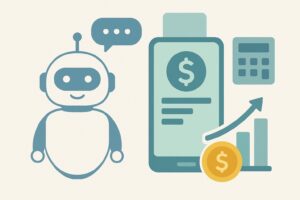
Let smart chats guide your money moves. Budgeting can feel tricky, but chatbots make it easier. These friendly digital assistants work inside budgeting apps and websites. You can chat with them like texting a friend, and they’ll help you make smart money choices. Here’s how chatbot-powered personal budgeting tips can fit into your daily routine.
Ask questions any time
Not sure how much to spend on takeout this week? Ask your budgeting chatbot. It gives fast answers based on your spending habits. Chatbots don’t judge—they just help. These personal budgeting tips are great when you need advice but don’t want to dig through an app.
Get reminders in real time Personal budgeting tips
Chatbots can send quick nudges when you’re close to your spending limit. If you’re about to overspend on clothes, you’ll get a gentle warning like, “Hey, you’ve spent 90% of your fashion budget this month.” These smart reminders turn personal budgeting tips into actions before you go overboard.
Track spending through conversation
You can even log your expenses in a chat. Just type, “I spent $12 on lunch,” and the chatbot updates your budget. It’s fast, easy, and feels natural. Plus, it works on the go—so no more forgetting later.
Chatbots turn personal budgeting tips into something fun and interactive. Instead of boring spreadsheets, you get helpful chats that guide you through each money move. Give it a try—you’ll see how simple budgeting can be.
Daily tracking with AI and personal budgeting tips
Stay on top of your spending with smart tools. Keeping track of your money every day can feel like a lot. But with AI tools, it’s easier than ever. You don’t need a calculator or a journal—just your phone and a few smart apps. These tools give you personal budgeting tips while tracking your expenses in real time.
Use apps that sync with your bank
AI budgeting apps connect directly to your bank account. They auto-track everything you spend—lunch, movies, even bus rides. You can see your spending in categories like food, entertainment, or bills. It’s one of the easiest personal budgeting tips to follow daily.
Get daily insights and reminders Personal budgeting tips
Each day, these tools can send updates like, “You’ve spent $5 on snacks today” or “Your grocery budget is 70% used.” These AI updates help you make better decisions fast. You’ll start noticing your habits and adjusting them before overspending. That’s how small personal budgeting tips make a big difference.
Set daily goals with smart help
AI can suggest daily spending goals based on your past behavior. For example, if you usually spend $20 a day, it might suggest lowering that to $15 to boost savings. These tips are simple, easy to follow, and made just for you.
With daily tracking powered by AI, personal budgeting tips become part of your everyday life. You don’t need to stress—just let the tech help you build better habits, one day at a time.
AI-powered savings and personal budgeting tips
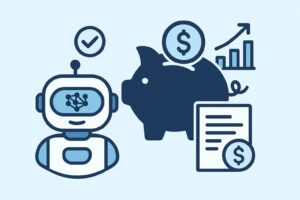
Let smart tech grow your savings. Saving money can feel tough when you’re just starting out. But AI makes it easier. With the right tools, you can save little by little without even thinking about it. These smart savings features also give you helpful personal budgeting tips along the way.
Automate savings based on your habits
AI-powered apps study your spending habits. If you usually have $10 left at the end of the week, the app might move that money into your savings automatically. You won’t even notice it’s gone. That’s one of the simplest personal budgeting tips—save what you won’t miss.
Set smart goals with tracking
Let’s say you want to save $300 for a trip. AI tools help you set that goal and break it into smaller steps. You’ll get updates like “You’re 30% there!” This kind of motivation keeps you going and makes personal budgeting tips feel more rewarding.
Get real-time savings advice
AI can even suggest when to save more or spend less. If you skipped eating out one week, your app might suggest putting that extra $15 into savings. It’s like having a smart friend who helps you stay on track.
With AI-powered savings tools, you don’t need big income to start saving. Just smart moves and the right guidance from these personal budgeting tips.
FAQs: Personal budgeting tips
What are personal budgeting tips for beginners?
Start small. Track what you earn and what you spend. Use a notebook or an app. Don’t forget to set a simple goal, like saving $20 a week. These basic personal budgeting tips help you get started without feeling overwhelmed.
How often should I update my budget?
Update your budget every week. It keeps things fresh and accurate. You’ll catch mistakes early and adjust spending fast. These regular check-ins are one of the best personal budgeting tips to stay in control.
Can I budget with just pocket money?
Yes! Even $5 a week counts. Divide your money into small categories—like snacks, savings, or games. Personal budgeting tips work at any income level. It’s about building good habits now.
What’s the easiest way to track spending daily?
Use free budget apps like EveryDollar or Goodbudget. Or keep a list on your phone. The key is to write things down as they happen. This simple step supports all your budgeting tips and helps you see where your money goes.
Why is saving part of budgeting?
Saving helps you reach your goals. Whether it’s a new phone or college fees, saving makes it possible. A good budget always includes a “save” section. That’s one of the top personal budgeting tips most students follow.
How do I stop spending too much on fun stuff?
Give yourself a spending limit. Use cash or a prepaid card so you don’t go over. If you track it, you’ll stay on top of it. Following this advice is one of the most helpful personal budgeting tips for staying balanced.
Conclusion
Budgeting doesn’t have to be hard. With the right tools and mindset, you can take control of your money one step at a time. Start small and stay consistent. Using smart apps and AI can make things easier. These tools can help you track spending, save more, and build better habits.
Try different personal budgeting tips to see what works for you. Maybe it’s daily tracking, using voice assistants, or setting up auto-savings. Pick the tips that fit your lifestyle best. Keep learning as you go. The more you try, the better you’ll get at managing money. These personal budgeting tips can grow with you as life changes.
Make sure your budget works for your goals. Whether it’s a game, a trip, or college savings, staying on track feels good. Stick with the personal budgeting tips that keep you focused and motivated. Budgeting is your money’s GPS—don’t leave home without it.

